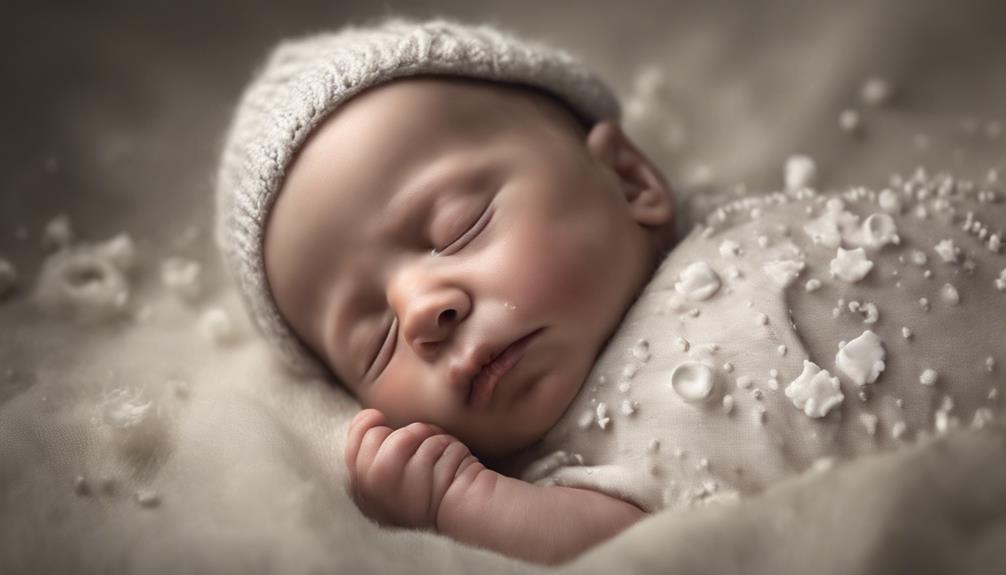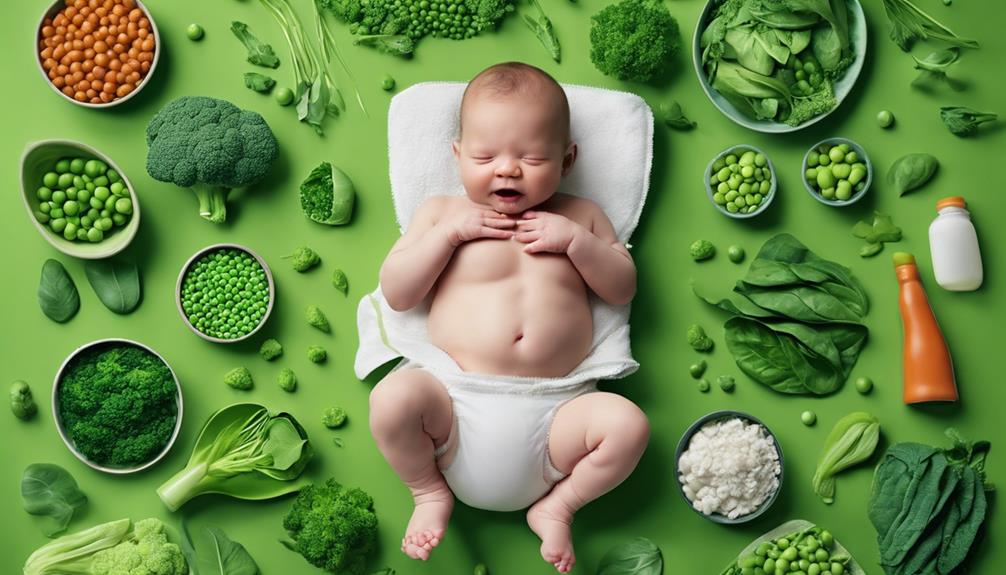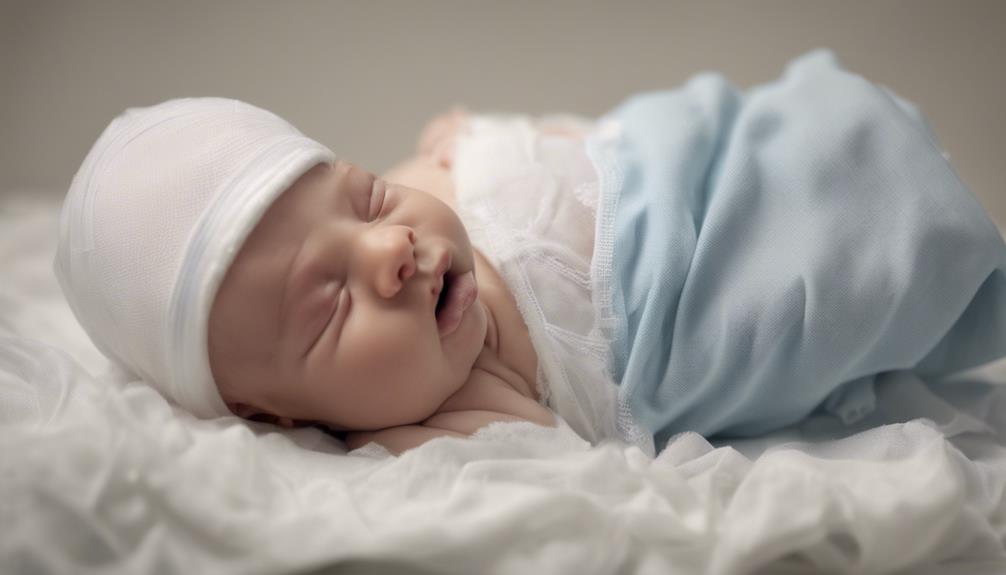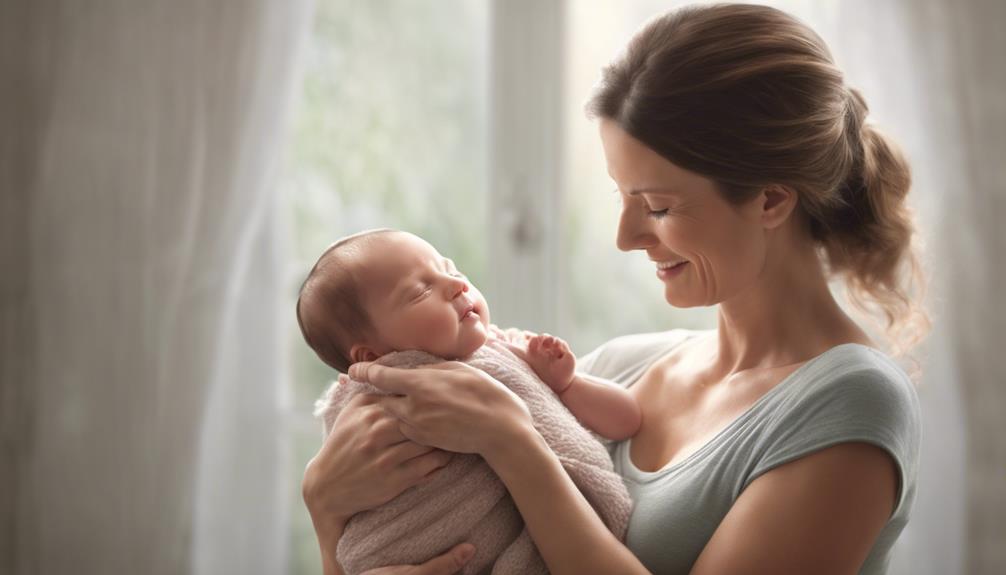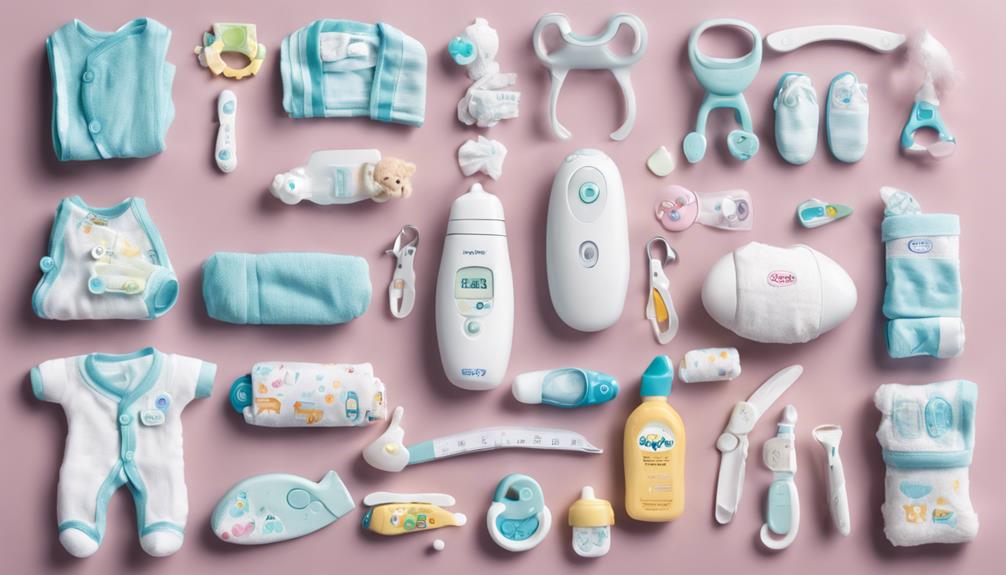So, you're wondering why those tiny bundles of joy seem to hiccup away while catching some Zs, huh? Well, let's shed some light on this mysterious phenomenon.
Imagine this – your newborn peacefully snoozing, and suddenly, *hiccup!* What gives? Could it be related to their adorable little digestive system, or perhaps something else entirely?
Stay tuned to uncover the secrets behind those nighttime hiccups and how you can help your little one find relief.
Key Takeaways
- Digestive system immaturity and underdeveloped nerves contribute to newborn hiccups during sleep.
- Swallowing air while feeding, overfeeding, and sleeping position can trigger hiccups in newborns.
- Stress, excitement, and hormonal changes impact hiccups during sleep cycles in newborns.
- Proper feeding techniques, burping, and creating a calm sleep environment help manage and prevent newborn hiccups.
Digestive System Immaturity
Due to their underdeveloped digestive system, newborns often experience hiccups while sleeping. The immaturity of their digestive system can lead to frequent spasms of the diaphragm, causing those adorable but sometimes disruptive hiccups. The underdeveloped nerves in their digestive tract play a significant role in triggering these involuntary contractions. In newborns, the coordination between the diaphragm and the nerves controlling breathing is still developing, making hiccups during sleep more common.
As newborns undergo rapid growth, their digestive systems are adapting to the demands of processing nutrients efficiently. This adjustment period can manifest as hiccups during sleep. The breathing control nerves are also in the process of maturing, which can contribute to these hiccups. It's essential to understand that experiencing hiccups during sleep is a normal part of a newborn's development as their bodies learn to coordinate digestion and breathing effectively.
Swallowing Air During Feeding
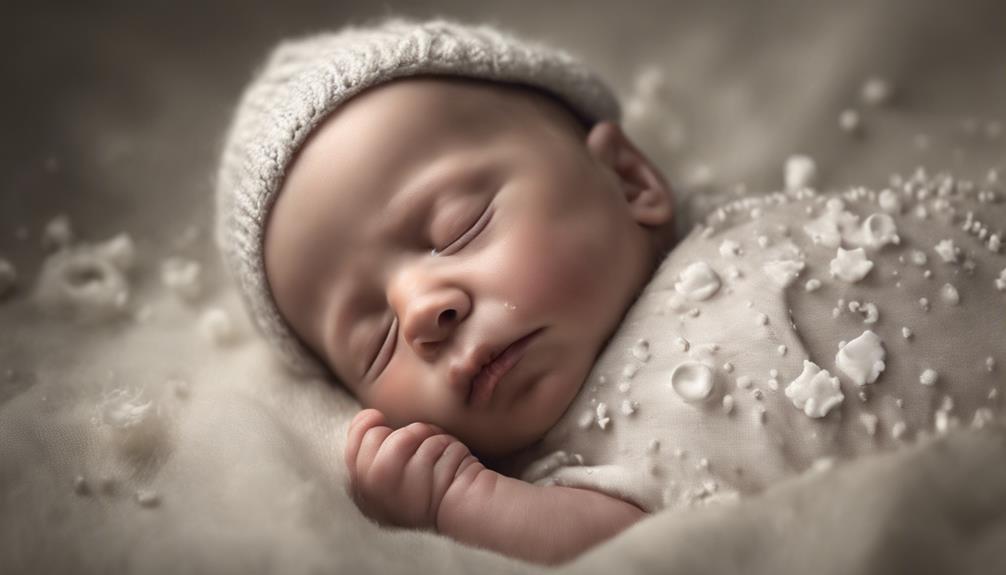
When feeding your newborn, how you position them can affect how much air they swallow. Remember, feeding slowly can reduce the amount of air your baby ingests, helping to prevent hiccups.
Don't forget to burp your little one after feeding to release any trapped air in their digestive system.
Feeding Position Affects
Positioning your newborn correctly during feeding plays an important role in preventing excess air intake and reducing the occurrence of hiccups while sleeping. Here are some tips to help you guarantee the right feeding position:
- Hold your baby upright: This can aid in minimizing air swallowing during feeding.
- Guarantee a proper latch: A good latch can help prevent your baby from gulping excess air.
- Adjust the feeding angle: Keeping your baby's head slightly elevated can promote proper swallowing.
- Stay attentive: Watch for signs of discomfort or fussiness during feeding, as these could indicate the need for a position adjustment.
Slow Feeding Reduces
To reduce the chances of your newborn swallowing air during feeding, adopting a slower pace can be beneficial in minimizing hiccups while they sleep. When newborns feed too quickly, they tend to gulp air along with milk, which can lead to hiccups disrupting their sleep.
By creating a calm and relaxed feeding environment and encouraging a slower feeding pace, you can help prevent excess air intake and reduce the occurrence of hiccups in your little one. Positioning your baby properly during feeding and utilizing paced bottle feeding techniques are also effective ways to minimize hiccups.
Burping After Feeding
After feeding your newborn, ensuring they burp properly is essential in releasing trapped air and minimizing the chances of hiccups during their sleep. Here's why burping after feeding is important for your little one:
- Prevents Gas Buildup: Burping helps release excess air swallowed during feeding, reducing the risk of gas accumulating in your baby's tummy.
- Minimizes Diaphragm Irritation: Proper burping techniques aid in preventing irritation to your baby's diaphragm, which can trigger hiccups.
- Enhances Comfort: By burping your newborn after feeding, you can make sure they're comfortable and less likely to experience discomfort from trapped air.
- Promotes Undisturbed Sleep: Effective burping techniques support better digestion, leading to a peaceful sleep without interruptions for your baby.
Overfeeding or Feeding Too Quickly
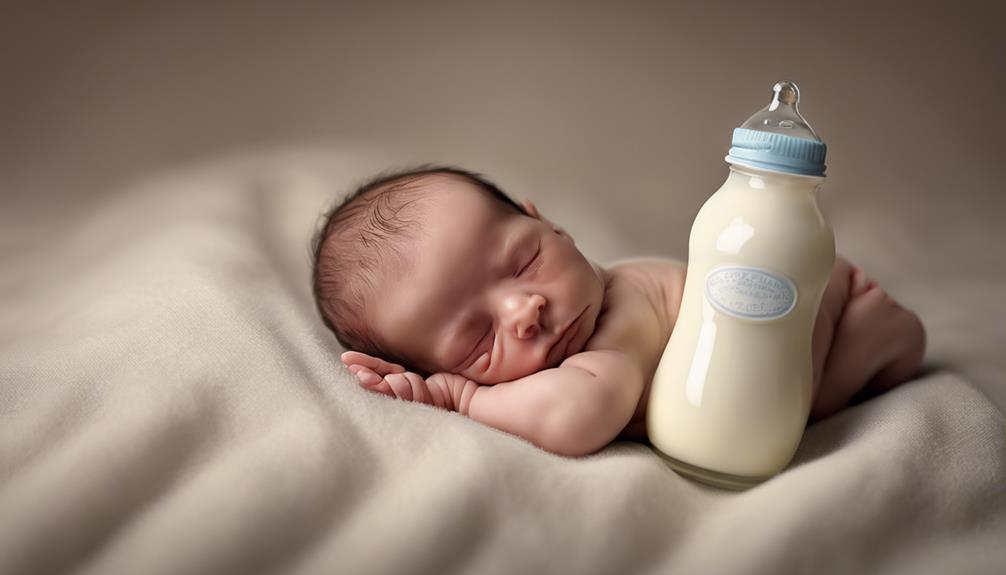
Feeding your newborn too quickly or overfeeding can lead to hiccups while they sleep. When babies consume more than they can handle, it often results in excess air swallowing, which can lead to those bothersome hiccups during their rest. Rapid feeding overwhelms their delicate digestive system, causing disruptions that manifest as hiccups, especially when they are lying down. To help prevent these nighttime disturbances, it is crucial to create a calm and relaxed feeding environment. Here's a breakdown of how overfeeding and rapid feeding contribute to those hiccup-filled slumbers:
| Factors | Effects | Preventive Measures |
|---|---|---|
| Overfeeding | Swallowing excess air, leading to hiccups | Monitor feeding amounts |
| Feeding too quickly | Overwhelming the digestive system | Pace feeding sessions |
| Rapid feeding | Disrupting the baby's digestion process | Burp frequently |
Sleeping Position
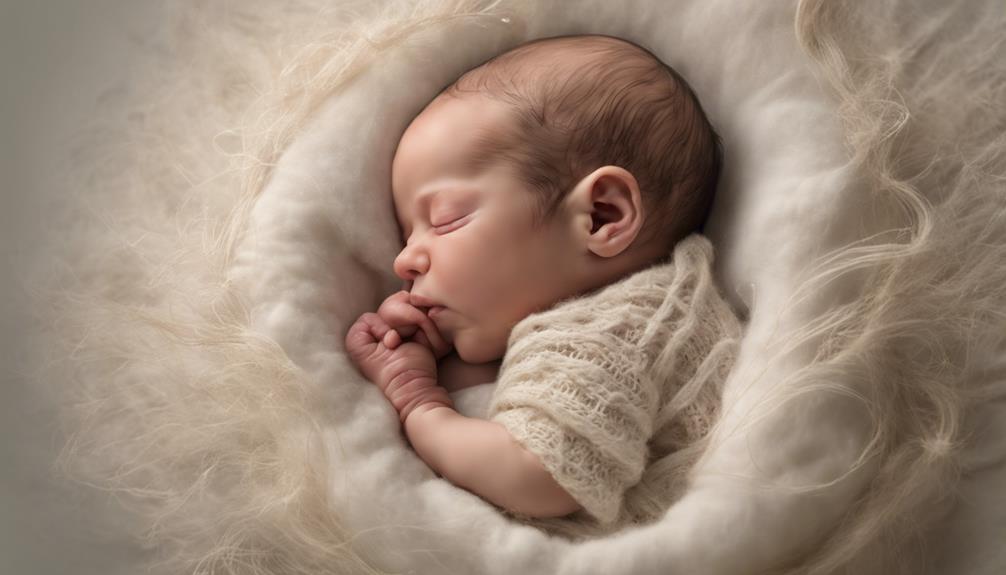
When considering your newborn's comfort during sleep, the position they rest in plays a significant role in the occurrence of hiccups. Here are some insights to help you understand how your baby's sleeping position can impact their likelihood of getting hiccups:
- Pressure on the Diaphragm: Sleeping on their back may sometimes put pressure on your newborn's diaphragm, leading to hiccups.
- Supine Sleeping Position: The recommended supine sleeping position for newborn safety can also contribute to hiccups during sleep.
- Adjusting Sleeping Position: Changing your baby's sleeping position or slightly altering the angle may help alleviate hiccups while they sleep.
- Elevating the Crib: Elevating the head of the crib slightly can also be a helpful way to reduce the occurrence of hiccups during your newborn's sleep.
Being aware of these factors and making small adjustments can make a big difference in ensuring your baby sleeps comfortably and peacefully, free from unnecessary hiccups.
Sudden Temperature Changes
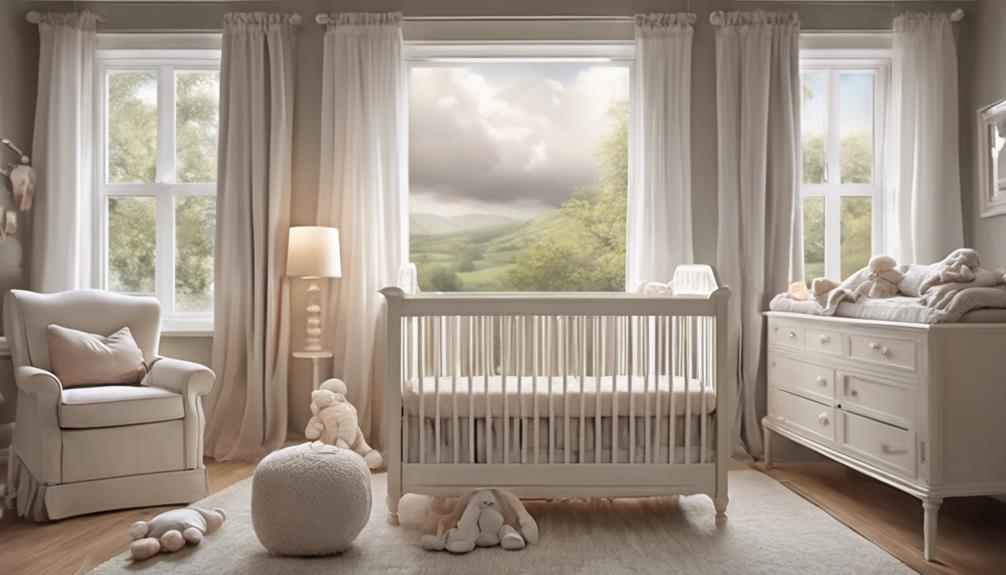
Hey there!
Sudden temperature changes can be a culprit behind those unexpected hiccups your newborn experiences during sleep.
Newborns are especially sensitive to shifts in room temperature, which can lead to their diaphragm spasming and causing hiccups.
Keeping your baby's sleep environment consistently warm can help minimize these hiccups triggered by rapid thermal variations.
Room Temperature Impact
Maintaining a stable and comfortable room temperature is essential in minimizing newborn hiccups during sleep, as sudden temperature changes can trigger diaphragm spasms leading to these involuntary contractions. Here are some key points to take into account:
- Temperature Sensitivity: Newborns are highly sensitive to temperature variations, which can disrupt their breathing pattern.
- Diaphragm Spasms: Sudden cold or heat can lead to diaphragm spasms, contributing to hiccups during sleep.
- Stable Environment: Ensuring a consistent room temperature environment is vital for reducing the occurrence of newborn hiccups.
- Breathing Disruption: Extreme temperatures can disturb a newborn's breathing, making them more prone to experiencing hiccups.
Swaddling for Warmth
Swaddling newborns for warmth can inadvertently lead to sudden temperature changes that may trigger hiccups during sleep. When you wrap your newborn snugly to keep them warm, their body temperature can fluctuate unexpectedly, potentially causing the diaphragm to spasm and result in hiccups.
While swaddling is beneficial for maintaining a comfortable body temperature, it's important to be mindful of how temperature shifts can impact your baby's sleep. To minimize the chances of hiccups due to temperature changes, make sure your baby isn't overheated or too cold while swaddled.
Regularly check and adjust their clothing and swaddling to help stabilize their body temperature and reduce the likelihood of hiccups interrupting their peaceful sleep.
Gastroesophageal Reflux (GERD)
During sleep, newborn hiccups may be triggered by gastroesophageal reflux (GERD), a condition where stomach contents flow back into the esophagus. If your little one is experiencing hiccups due to GERD while sleeping, here are some key points to bear in mind:
- GERD Impact: GERD causes stomach contents to flow back into the esophagus, leading to hiccups during sleep.
- Irritation: Acidic stomach contents irritating the esophagus can result in hiccups while your baby is resting.
- Associated Symptoms: GERD-related hiccups in newborns may be accompanied by spitting up or signs of discomfort.
- Management: Proper feeding techniques and seeking guidance from a pediatrician can assist in reducing hiccups during your baby's sleep time.
Understanding how GERD contributes to your newborn's hiccups during sleep can help you take appropriate steps to address this condition effectively. Remember, consulting with a healthcare provider is essential for tailored advice and support in addressing GERD-related hiccups in your little one.
Stress or Excitement

If your newborn appears agitated or overstimulated, these feelings can lead to hiccups while they're sleeping. Stress or excitement can trigger newborn hiccups as their developing nervous system responds to stimuli, sometimes causing spasms in the diaphragm. During sleep, newborns may experience hiccups when moving between sleep cycles or during active sleep phases.
The immaturity of their reflex control can also contribute to these hiccups. Sleep disturbances or irregular sleep patterns may exacerbate the occurrence of hiccups while sleeping. Hormonal changes during sleep cycles play a role in causing hiccups as well.
Understanding that your newborn's nervous system is still developing and that hiccups during sleep are often part of this process can help alleviate any concerns. Providing a calm and soothing environment before sleep may help reduce stress and excitement, potentially minimizing the occurrence of hiccups while your newborn is resting.
Frequently Asked Questions
Is It Normal for My Newborn to Have Hiccups While Sleeping?
It's completely normal for your newborn to have hiccups while sleeping. Their developing diaphragm and immature digestive system can trigger this reflex. Most babies outgrow this as they grow. It's usually harmless and part of their development.
How Do You Get Rid of Hiccups in a Sleeping Baby?
To help your sleeping baby with hiccups, gently pat or burp them, adjust their position, keep feedings separate from sleep, and maintain a calm sleep environment. If the hiccups persist, consult a pediatrician for guidance.
What to Do if Baby Has Hiccups at Night?
When baby has hiccups at night, gently soothe by holding upright for a bit. Burping before bedtime helps too. Avoid feeding right before sleep to prevent hiccups. You'll both rest easy.
How Do I Stop My Newborn From Getting Hiccups?
To stop your newborn from getting hiccups, try burping them before and after feeding, keep them upright after meals, establish a calming bedtime routine, avoid overfeeding, and consider using a pacifier. These simple steps can help prevent hiccups while your baby sleeps.
Conclusion
So, next time your newborn gets hiccups while sleeping, remember it's usually nothing to worry about. Their tiny bodies are just adjusting to the world around them.
But if the hiccups persist or seem to bother them, don't hesitate to reach out to your pediatrician for reassurance.
After all, isn't it better to be safe than sorry when it comes to your precious little one's well-being?
